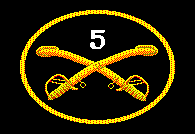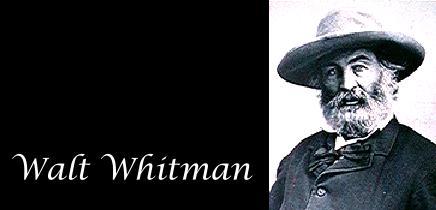

Walt Whitman (1819-1892) was the son of a carpenter who became apprenticed to a printer. He later edited the Long-Islander in Huntington, New York, but after growing bored, he returned to New York City to work as a printer and journalist. A political activist, the Tammany Hall Democrats rewarded him with the editorship of various newspapers. Eventually he turned his focus to a new kind of poetry, and correspondingly neglected his business.
Drum-Taps was published in 1865 and reflects his deepening awareness of the significance of the American Civil War. He also expresses his hope for reconciliation between North and South. Sequel to Drum-Taps, published the following year, contains "When Lilacs Last in the Dooryard Bloom'd," the great elegy for President Abraham Lincoln. During the War Between the States, the wounding of Whitman's brother, George Washington Whitman, moved him to minister to wounded soldiers in Union army hospitals in Washington, D.C. He remained there, working as a government clerk, until 1873, when he suffered a stroke that left him partially paralyzed. He then went to live with his brother George.
The selections which follow are taken from Drum Taps and its sequel.
Cavalry Crossing A Ford
A LINE in long array where they wind betwixt green islands,
They take a serpentine course, their arms flash in the sun--hark to the musical clank,
Behold the silvery river, in it the splashing horses loitering stop to drink,
Behold the brown-faced men, each group, each person a picture, the negligent rest on the saddles,
Some emerge on the opposite bank, others are just entering the ford--while,
Scarlet and blue and snowy white,
The guidon flags flutter gayly in the wind.
Bivouac on a Mountain Side
I SEE before me now a traveling army halting,
Below a fertile valley spread, with barns and the orchards of summer,
Behind, the terraced sides of a mountain, abrupt, in places rising high,
Broken, with rocks, with clinging cedars, with tall shapes dingily seen,
The numerous camp-fires scatter'd near and far, some away up on the mountain,
The shadowy forms of men and horses, looming, large-sized, flickering,
And over all the sky--the sky! far, far out of reach, Studded, breaking out, the eternal stars.
Hush'd Be the Camps Today
May 4, 1865
HUSH'D be the camps today,
And soldiers let us drape our war-worn weapons,
And each with musing soul retire to celebrate,
Our dear commander's death.
No more for him life's stormy conflicts,
Nor victory, nor defeat--no more time's dark events,
Charging like ceaseless clouds across the sky.
But sing poet in our name,
Sing of the love we bore him--because you, dweller in camps, know it truly.
As they invault the coffin there,
Sing--as they close the doors of earth upon him--one verse,
For the heavy hearts of soldiers.
Reconciliation
Word over all, beautiful as the sky,
Beautiful that war and all its deeds of carnage must in time be utterly lost,
That the hands of the sisters Death and Night incessantly softly wash again,
and ever again, this soil'd world;
For my enemy is dead, a man divine as myself is dead,
I look where he lies white-faced and still in the coffin--I draw near,
Bend down and touch lightly with my lips the white face in the coffin.
Beat! Beat! Drums!
BEAT! beat! drums! -- blow! bugles! blow!
Through the windows -- through doors -- burst like a ruthless force,
Into the solemn church, and scatter the congregation,
Into the school where the scholar is studying;
Leave not the bridegroom quiet -- no happiness must he have now with his bride,
Nor the peaceful farmer any peace, ploughing his field or gathering his grain,
So fierce you whirr an pound you drums -- so shrill you bugles blow.
Beat! beat! drums! -- blow! bugles! blow!
Over the traffic of cities -- over the rumble of wheels in the streets;
Are beds prepared for sleepers at night in the houses? no sleepers must sleep in those beds,
No bargainers bargains by day -- no brokers or speculators -- would they continue?
Would the talkers be talking? would the singer attempt to sing?
Would the lawyer rise in the court to state his case before the judge?
Then rattle quicker, heavier drums -- you bugles wilder blow.
Beat! beat! drums! -- blow! bugles! blow!
Make no parley -- stop for no expostulation,
Mind not the timid -- mind not the weeper or prayer,
Mind not the old man beseeching the young man,
Let not the child's voice be heard, nor the mother's entreaties,
Make even the trestles to shake the dead where they lie awaiting the hearses,
So strong you thump O terrible drums -- so loud you bugles blow.
